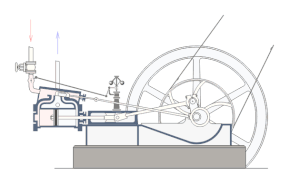Technology


Technology ("the teaching or science of craft", from Greek: τέχνη téchne "skill, artistry, craft" and -λογία -logia "teaching, learning, reason") in its broadest sense encompasses all the techniques, processes, methods, skills and theoretical knowledge to transform nature for a purpose by producing artistic, craft or industrial products, or to perform services in order to satisfy material as well as cultural needs. Moreover modern technology can be embedded in machines to allow for more or less autonomous operation without detailed knowledge of their workings.
Technology that is state of the art and uses the most modern processes is called high technology, cutting-edge technology or high tech for short. The philosophy of technology deals with the philosophical and the ethics of technology specifically with the ethical implications of technology and its relationship to man and the world or nature.
The history of technology is closely interwoven with human history. From the very beginning, technology was an essential and necessary part of being human, but for a long time it was limited to the narrowest needs. Technology experienced a first significant upswing with the first advanced civilisations of the Egyptian-Chaldean period, when humanity began to develop the sentient soul. A further advance was achieved in the Greco-Latin period. However, the great, almost explosive breakthrough of technology came only with our present consciousness-soul age, especially with the Industrial Revolution that began in the late 18th century and intensified from the middle of the 19th century. Technology itself became an essential and necessary driving force for the further development of the consciousness soul. Associated with this were far-reaching effects on the natural and social environment. In order to assess the risks to humans and the earth associated with rapid technological progress, the research field of technology assessment (TA) emerged in the USA in the 1960s and increasingly spread to Europe from the 1970s onwards.
Literature
- Ivan Illich: Tools for Conviviality, Marion Boyars 2001, ISBN 978-1842300114; eBook ASIN B007558B04
- Andrea Vetter: Convivial and Emancipatory Technologies – suitable conceptions for Technology in a Degrowth Society?, Degrowth conference, Leipzig, September 2014 researchgate.net
- Andrea Vetter: The Matrix of Convivial Technology – Assessing technologies for degrowth. in: Journal of Cleaner Production 197. March 2017 doi:10.1016/j.jclepro.2017.02.195 researchgate.net
- Paul Emberson: Maschinen und Menschengeist, The DewCross Centre for Moral Technology, Edinburgh 2013
- Paul Emberson: From Gondishapur to Silicon Valley, Volume I, Etheric Dimensions Press, Switzerland and Scottland 2012
- Paul Emberson: From Gondishapur to Silicon Valley, Volume II, Etheric Dimensions Press, Switzerland and Scottland 2014
- Paul Emberson: From Gondishapur to Silicon Valley, Volume III, Etheric Dimensions Press, Switzerland and Scottland
- Rudolf Steiner: Vier Mysteriendramen, GA 14 (1998), ISBN 3-7274-0140-0 English: rsarchive.org German: pdf pdf(2) html mobi epub archive.org
- Rudolf Steiner: Anthroposophische Leitsätze, GA 26 (1998) English: rsarchive.org German: pdf pdf(2) html mobi epub archive.org
- Rudolf Steiner: Der Goetheanumgedanke inmitten der Kulturkrisis der Gegenwart, GA 36 (1961), ISBN 3-7274-0360-8 English: rsarchive.org German: pdf pdf(2) html mobi epub archive.org
- Rudolf Steiner: Die Tempellegende und die Goldene Legende , GA 93 (1991), ISBN 3-7274-0930-4 English: rsarchive.org German: pdf pdf(2) html mobi epub archive.org
- Rudolf Steiner: Das esoterische Christentum und die geistige Führung der Menschheit, GA 130 (1987) English: rsarchive.org German: pdf pdf(2) html mobi epub archive.org
- Rudolf Steiner: Menschenschicksale und Völkerschicksale, GA 157 (1981), ISBN 3-7274-1571-1 English: rsarchive.org German: pdf pdf(2) html mobi epub archive.org
- Rudolf Steiner: Das Karma des Berufes des Menschen in Anknüpfung an Goethes Leben, GA 172 (2002), ISBN 3-7274-1720-X English: rsarchive.org German: pdf pdf(2) html mobi epub archive.org
- Rudolf Steiner: Zeitgeschichtliche Betrachtungen. Das Karma der Unwahrhaftigkeit – Erster Teil, GA 173 (1978), ISBN 3-7274-1730-7 English: rsarchive.org German: pdf pdf(2) html mobi epub archive.org
- Rudolf Steiner: Individuelle Geistwesen und ihr Wirken in der Seele des Menschen, GA 178 (1992), ISBN 3-7274-1780-3 English: rsarchive.org German: pdf pdf(2) html mobi epub archive.org
- Rudolf Steiner: Mysterienwahrheiten und Weihnachtsimpulse, GA 180 (1980) English: rsarchive.org German: pdf pdf(2) html mobi epub archive.org
- Rudolf Steiner: Die Polarität von Dauer und Entwickelung im Menschenleben. Die kosmische Vorgeschichte der Menschheit., GA 184 (2002), ISBN 3-7274-1840-0 English: rsarchive.org German: pdf pdf(2) html mobi epub archive.org
- Rudolf Steiner: Die soziale Grundforderung unserer Zeit – In geänderter Zeitlage, GA 186 (1990), ISBN 3-7274-1860-5 English: rsarchive.org German: pdf pdf(2) html mobi epub archive.org
- Rudolf Steiner: Perspektiven der Menschheitsentwickelung, GA 204 (1979) English: rsarchive.org German: pdf pdf(2) html mobi epub archive.org
- Rudolf Steiner: Initiations-Erkenntnis, GA 227 (1982) English: rsarchive.org German: pdf pdf(2) html mobi epub archive.org
- Rudolf Steiner: Kunst im Lichte der Mysterienweisheit, GA 275 (1990), ISBN 3-7274-2750-7 English: rsarchive.org German: pdf pdf(2) html mobi epub archive.org
- Rudolf Steiner: Die gesunde Entwicklung des Menschenwesens, GA 303 (1978) English: rsarchive.org German: pdf pdf(2) html mobi epub archive.org
- Rudolf Steiner: Die vierte Dimension, GA 324a (1995) English: rsarchive.org German: pdf pdf(2) html mobi epub archive.org
 |
References to the work of Rudolf Steiner follow Rudolf Steiner's Collected Works (CW or GA), Rudolf Steiner Verlag, Dornach/Switzerland, unless otherwise stated.
Email: verlag@steinerverlag.com URL: www.steinerverlag.com. Index to the Complete Works of Rudolf Steiner - Aelzina Books A complete list by Volume Number and a full list of known English translations you may also find at Rudolf Steiner's Collected Works Rudolf Steiner Archive - The largest online collection of Rudolf Steiner's books, lectures and articles in English. Rudolf Steiner Audio - Recorded and Read by Dale Brunsvold steinerbooks.org - Anthroposophic Press Inc. (USA) Rudolf Steiner Handbook - Christian Karl's proven standard work for orientation in Rudolf Steiner's Collected Works for free download as PDF. |
